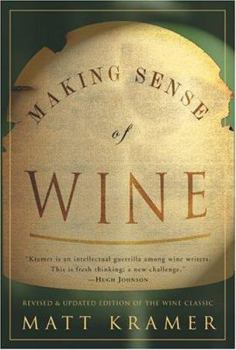Making Sense of Wine
Select Format
Select Condition 
Book Overview
The paperback edition of this highly praised wine classic includes a new preface and an all-new chapter that covers changes and advances in winemaking since the book's initial publication in 1989.... This description may be from another edition of this product.
Format:Hardcover
Language:English
ISBN:0762415797
ISBN13:9780762415793
Release Date:August 2003
Publisher:Running Press Book Publishers
Length:240 Pages
Weight:0.95 lbs.
Dimensions:0.9" x 5.8" x 8.6"
Customer Reviews
5 ratings
A superb introduction to enjoying wine
Published by Thriftbooks.com User , 17 years ago
This is a thoroughly revised and updated edition of the 1989 book by a popular "Wine Spectator" writer. Kramer writes. "I can say, without exaggeration, that the 1990s were the most transforming ten-year span in the history of fine wine." Kramer does a fine job of explaining these changes. Kramer is a regular contributor to the "Oregonian", "The New York Sun", and of course "Wine Spectator". At the annual Spectator wine weekends, Kramer always presents an intensely personal lecture, very different from anything else on offer, and year after year he wins the award for the best presentation from the 1000 plus audiences. I personally subscribe to the "Sun" online simply to read his work on a regular basis; he always has something interesting to write about. Here's a recent example so you can judge his style and his insights: "Although wine seems somehow fixed, even staid, the facts tell a different story. The past few decades have seen two revolutions that have permanently rearranged the landscape on both sides of the aisle, as it were. "From the wine-producing side, the great revolution was the rise and current preeminence of estate bottling, where the grower makes wine only from his or her own grapes and sells it under his or her own label. Prior to the 1960s, estate bottling was a rarity everywhere in the world. Today, estate bottling is commonplace. "On the consumer side, the upheaval is the worldwide democratization of wine. Where once wine was unapologetically elitist, today all are welcome -- indeed, aggressively pursued. Everything about wine -- the way it's labeled, how it's distributed, and, not least, how it's talked and written about -- has been profoundly altered by democratization. "The paradox is that these two revolutions are almost, but not quite, mutually antagonistic. Estate bottling, by its very definition, is a dinner party with limited seating. "This, in turn, conflicts with the premise of democratization. Encouraged to participate, consumers expect to find what they're looking for with no more difficulty than in buying any other household item." There is no better introduction to wine. Robert C. Ross 2007 2008
Must Read for any Wine Enthusiast
Published by Thriftbooks.com User , 18 years ago
Will further your interest in becoming a connoisseur (even if you don't know you'd like to become one yet). Best for thoes with at least a basic appreciation. Read after Andrea Immer's "Great Wine Made Simple," which provides a great introduction. "Making Sense of Wine" is more general in content.
Elegantly written
Published by Thriftbooks.com User , 19 years ago
An elegant book about an elegant subject. Learned a lot and was intellectually engaged. Not a thorough primer on wine or tasting but rather a thorough discourse on the important topics in wine today.
Stop making sense
Published by Thriftbooks.com User , 20 years ago
The title of the book is amusing given the numerous times the author refutes his own arguments on one point or another. Self-consistency, one imagines, is essential to "making sense."For instance, he waxes eloquent in his novelistic style about how critical maintaining the cork was to the evolution of the bottle shape: "...there couldn't have been much laying down or cellaring of wines, at least to judge from the shape of the bottle...The bulbous base of the Globe and Spike made laying it sideways quite difficult and the long neck made it that much harder for the wine to neslte against a cork, keeping it moist and swollen, the seal intact." (p128) This is followed soon after by: "There is even serious doubt as to whether it is necessary to lay the bottles on their sides to keep the cork moist...I can attest from personal experience that the corks and the wines appear no different from old wines stored horizontally." (along with further arguments and examples, p139)So if we bought the book hoping to "make sense" of all this, should we infer that laying bottles on their side is better or not?The author, who doesn't include a single illustration save one of himself, appears to be on a search for "truth in wine," which he argues in his first chapter is in fact reachable in the form of "standards." He then proceeds to demonstrate how such standards are indeed beyond the reach of objective truth in practice.Nonsense.However, I think everyone truly interested in wine should read this, if only to deepen the delicious enigma.
Intelligent intro to wine
Published by Thriftbooks.com User , 27 years ago
The wine writer for the Portland Oregonian presents a truly intelligent introduction to wine, an excellent starting point for a novice who wants to ramp up his knowledge quickly and well, and a good read even for those who think they know it all





